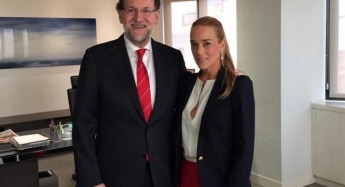Published on 29 October 2014 by Venezuela Analysis
 On Tuesday the Venezuelan Foreign Office announced the government’s decision to recall their ambassador to Spain, Mario Isea Bohórquez, for consultations. A hardline opposition leader, currently imprisoned and facing charges of inciting violence, refused to attend his own trial yesterday in in an attempt to pressure the government to respond to a United Nations request for his immediate release.
On Tuesday the Venezuelan Foreign Office announced the government’s decision to recall their ambassador to Spain, Mario Isea Bohórquez, for consultations. A hardline opposition leader, currently imprisoned and facing charges of inciting violence, refused to attend his own trial yesterday in in an attempt to pressure the government to respond to a United Nations request for his immediate release.As part of the process of reviewing, in full, the diplomatic relations with Spain, and as consequence of the interventionist declarations of Spain’s head of government Mariano Rajoy, [the Venezuelan government] has decided to call back for consultations Venezuela’s ambassador in Spain,” stated the communique from Venezuelan authorities yesterday.
The decision comes after Rajoy posted his concern on Facebook that Venezuela was not respecting its citizens’ right to protest, after Lopez’s wife Lilian Tintori met with the Spanish president in Genova, Italy last Wednesday.
In the statement, the Venezuelan government noted that Rajoy’s party, the conservative Popular Party (PP), also supported the attempted military coup against then Venezuelan President Hugo Chávez in 2002, when PP’s José María Aznar was president of Spain.
In comments broadcast live on state television channel VTV, Maduro denounced the Spanish leader’s “irresponsible” declarations last week, before instructing foreign minister Rafael Ramirez to “review diplomatic relations” with the European country.
”He simply does not have the moral authority to talk about Bolivarian Venezuela; Venezuela is to be respected, Mr Rajoy,” stated Maduro.
“Go and talk about the disaster that you’re inflicting on Spain and the Spanish people… You have flagrantly evicted 700,000 Spanish people from their homes, why don’t you sort out those problems?” added Maduro.
Meanwhile, far right opposition figure Leopoldo Lopez, who has been jailed since February for his role in the violent street demonstrations that left 43 dead, was scheduled to appear in court yesterday, but refused to leave the military prison where he is being held.
“I, Leopoldo Lopez … as a prisoner of conscience, have decided not to attend the trial hearing scheduled for today [Tuesday],” read a hand-written note the politician posted in a photo to his frequently updated Twitter account.
Lopez’s defense attorney, Roberto Marrero, told reporters they expected the Venezuelan court to heed an October 8 recommendation from the UN Working Group on Arbitrary Detention that called for the politician’s immediate release.
Critics such as Venezuelan constitutional lawyer Jesus Silva, have pointed to the defense’s repeated attempts to delay Lopez’s trial in an effort to use it “as an international political platform,” rather than face the court proceedings.
On Tuesday, Venezuelan representative German Saltron defended the official stance before an inquiry of the Inter-American Commission on Human Rights (CIDH, for its initials in Spanish), in Washington.
Saltron accused US president Barack Obama of being behind the UN Working Group’s suggestion, citing a similar statement issued by Obama during a September address to the UN.
“He called for the liberation of Leopoldo Lopez because he is one of his emperors in our country,” Saltron told the CIDH, while insisting Lopez “is responsible, along with other leaders of the Venezuelan opposition, for the death of 43 Venezuelans and 169 injured during the period of February to June of 2014.”
Saltron noted that although the UN Working Group “suggests, without demanding or ordering” Lopez’s release, he is currently “being tried by our tribunals, and for that reason a request to intervene…cannot be [accepted], unless there is proof that his physical integrity is in imminent danger, which is not the case.”
Venezuela has not accepted an “observational visit” from the CIDH since 2002, and left the organization last September, saying it primarily serves US interests.




